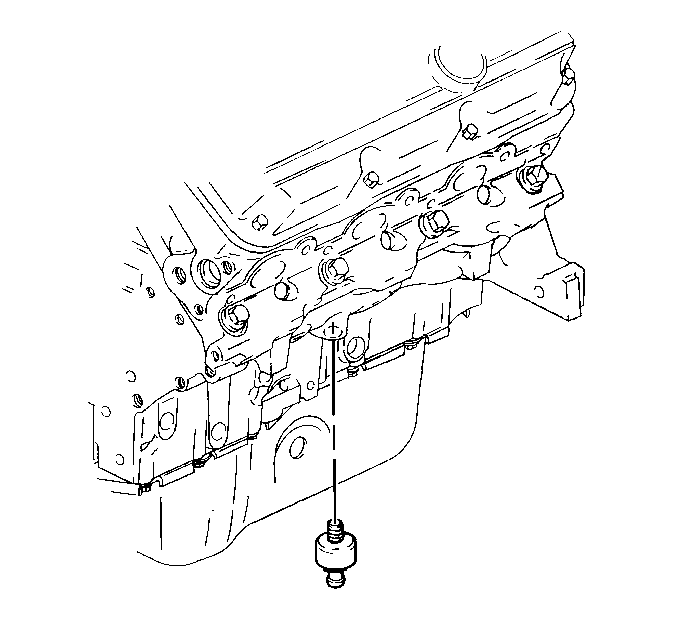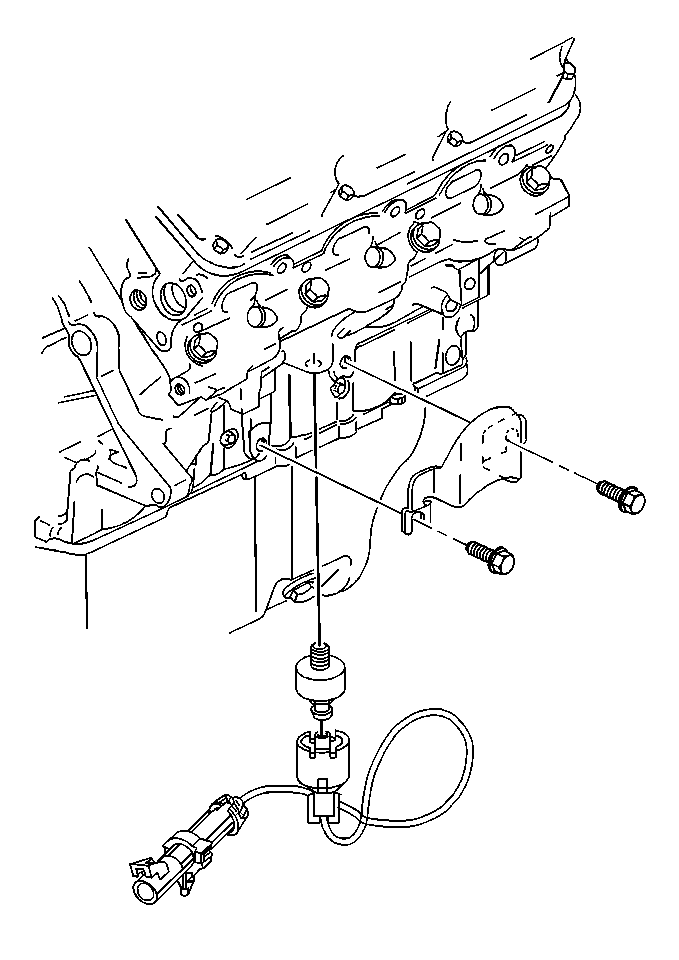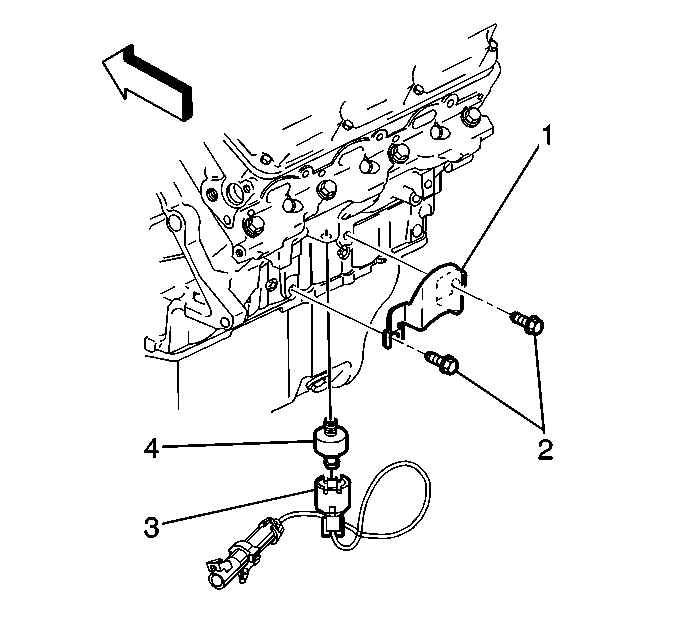Knock Sensor Replacement Bank 1
Removal Procedure
Caution: Hot engine coolant may cause severe burns. Although the cooling system has been drained, coolant still remains in the engine water jacket. This coolant will drain with the removal of the knock sensor.
- Disconnect the negative battery cable.
- Raise the vehicle. Refer to Lifting and Jacking the Vehicle in General Information.
- Remove the splash shield. Refer to Engine Splash Shield Replacement in Body Rear End.
- Drain the cooling system. Refer to Cooling System Draining and Filling in Engine Cooling.
- Remove the knock sensor heat shield mounting bolt located under the freeze plug (or block heater if equipped).
- Disconnect the knock sensor wiring harness connector from the knock sensor.
- Remove the knock sensor from the engine block.
Caution: Unless directed otherwise, the ignition and start switch must be in the OFF or LOCK position, and all electrical loads must be OFF before servicing any electrical component. Disconnect the negative battery cable to prevent an electrical spark should a tool or equipment come in contact with an exposed electrical terminal. Failure to follow these precautions may result in personal injury and/or damage to the vehicle or its components.
Caution: Provide additional support when a vehicle is on a hoist:
• Before removing parts, support the opposite end. This helps prevent
the vehicle from slipping off. • Before removing major components, chain the vehicle frame to the
hoist pads at the same end as the removal. This helps avoid a tip-off.


Installation Procedure
- Install the knock sensor into the engine block.
- Install the knock sensor heat shield mounting bolt located under the freeze plug (or block heater if equipped).
- Connect the knock sensor wiring harness connector to the knock sensor.
- Install the splash shield. Refer to Engine Splash Shield Replacement in Body Rear End.
- Lower the vehicle.
- Fill the cooling system. Refer to Cooling System Draining and Filling in Engine Cooling.
- Connect the negative battery cable.

Notice: Use the correct fastener in the correct location. Replacement fasteners must be the correct part number for that application. Fasteners requiring replacement or fasteners requiring the use of thread locking compound or sealant are identified in the service procedure. Do not use paints, lubricants, or corrosion inhibitors on fasteners or fastener joint surfaces unless specified. These coatings affect fastener torque and joint clamping force and may damage the fastener. Use the correct tightening sequence and specifications when installing fasteners in order to avoid damage to parts and systems.
Important: Do Not apply thread sealant to sensor threads. The sensor is coated at factory and applying additional sealant will affect the sensor's ability to detect detonation.
Tighten
Knock sensor to 19 N·m (14 lb ft).
Knock Sensor Replacement Bank 2
Removal Procedure
Caution: Hot engine coolant may cause severe burns. Although the cooling system has been drained, coolant still remains in the engine water jacket. This coolant will drain with the removal of the knock sensor.
- Disconnect the negative battery cable. Refer to Battery Cable in Engine Electrical.
- Raise the vehicle. Refer to Lifting and Jacking the Vehicle
- Remove the bolts from the splash shield.
- Drain the cooling system. Refer to Cooling System Draining and Filling in Engine Cooling.
- Remove the bolts (2) from the knock sensor heat shield (1) located under the freeze plug (or block heater if equipped).
- Disconnect the knock sensor wiring harness connector (3) from the knock sensor (4).
- Remove the knock sensor from the engine block.

Caution: Unless directed otherwise, the ignition and start switch must be in the OFF or LOCK position, and all electrical loads must be OFF before servicing any electrical component. Disconnect the negative battery cable to prevent an electrical spark should a tool or equipment come in contact with an exposed electrical terminal. Failure to follow these precautions may result in personal injury and/or damage to the vehicle or its components.
Caution: Provide additional support when a vehicle is on a hoist:
• Before removing parts, support the opposite end. This helps prevent
the vehicle from slipping off. • Before removing major components, chain the vehicle frame to the
hoist pads at the same end as the removal. This helps avoid a tip-off.

Installation Procedure
Important: Do Not apply thread sealant to sensor threads. The sensor is coated at factory and applying additional sealant will affect the sensor's ability to detect detonation.
- Install the knock sensor (4) into the engine block.
- Install the knock sensor heat shield.
- Connect the knock sensor electrical connector (3) to the knock sensor (4).
- Install the splash shield.
- Lower the vehicle.
- Fill the cooling system. Refer to Cooling System Draining and Filling in Engine Cooling.
- Connect the negative battery cable. Refer to Battery Cable in Engine Electrical.

Notice: Use the correct fastener in the correct location. Replacement fasteners must be the correct part number for that application. Fasteners requiring replacement or fasteners requiring the use of thread locking compound or sealant are identified in the service procedure. Do not use paints, lubricants, or corrosion inhibitors on fasteners or fastener joint surfaces unless specified. These coatings affect fastener torque and joint clamping force and may damage the fastener. Use the correct tightening sequence and specifications when installing fasteners in order to avoid damage to parts and systems.
Tighten
Tighten the knock sensor to 19 N·m (14 lb ft).
Tighten
Tighten the bolts to 60 N·m (44 lb ft).
